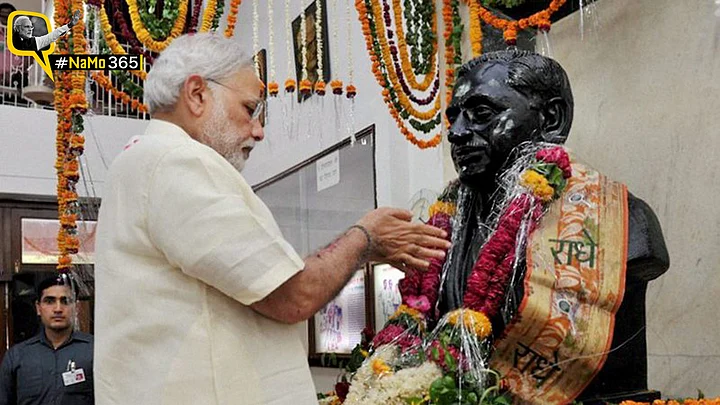The most notable feature of Prime Minister Narendra Modi’s 40-minute speech in Mathura’s Nagla Chandrabhan village, which is the birthplace of Bharatiya Jana Sangh ideologue Deendayal Upadhayay, was the complete obliteration of Jawaharlal Nehru as an architect of post-independence India.
In his dramatic speech, marked to observe the first year of his government in power, Modi’s contention was that only three great men — M K Gandhi, Ram Manohar Lohia, and Upadhyay — left an indelible impact on India’s politics and governance. In their own way, Gandhi, Lohia, and Updhayay each played significant roles in addressing poverty in the country.
Redefining the Pantheon of India’s Architects

But Modi’s omission of Nehru from the pantheon of India’s greatest, which will certainly rankle the Congress, is a tad unfair. While Nehru did falter on many fronts in his quest to provide a socialist framework to India’s post-independence economy, there is no doubt that the policies initiated by him in the aftermath of partition, and the rocky first decade were seminal.
One can safely observe that Atal Behari Vajpayee would have employed a different tack.
What was more inexplicable was the lionising of Updhayay, the relatively obscure figure whose concept of “integral humanism”, which is central to the Sangh Parivar’s philosophy, in visualising a decentralised polity, and the village as the focal point of India’s self-reliant economy, has little resonance in a country aspiring to catch up with the developed world.
He sought to liken Upadhayay’s relentless drive to “keep working, keep moving” to his own sustained pursuit of “minimum government, maximum governance.”
Modi deployed a clever mix of Upadhayay’s vision and his narrative of eliminating poverty that formed the thrust of his speech. The impassioned speech rolled out endless policy minutiae on social sector reforms, empowerment of the poor, and his government’s decision to stand by poor and marginalised farmers, and the 32 lakh small pensioners.
He can make justifiable claims on the Jan Dhan scheme, the baby steps that his government has taken towards ensuring social security for the old, direct cash transfer, and bank accounts for the poor.
A Narrative Shift: From Growth to Poverty Alleviation

However, while the government’s intention has been good, the promises — solving the problem of youth unemployment, skill development, Swachh Bharat, toilets for every household, and houses for the poor by 2022 — will take time for them to translate into implemented policy. A year is perhaps too short a time for a government to deliver on all fronts.
The more tangible effects, of course, have been on taming inflation which seared the middle class’s pocket during the UPA regime.
While showcasing the social sector reforms and the government’s initiative to do away with obsolete laws and regulations, Modi chose not to step into the minefield of more controversial decisions, the Land Acquisition Bill for instance.
Curiously enough, the Prime Minister shied away from extolling on his government’s foreign policy, nearer home or farther West and East, his engagement with the United States and China, the ratification of the India-Bangladesh Land Boundary Agreement, the humanitarian efforts in earthquake-devastated Nepal, and evacuation of Indians from Iraq and Yemen.
By avoiding the ‘hard issues’, which admittedly will require more than a year before they begin to bear fruit, Modi sought to employ the poverty narrative, much like the UPA. Poverty elimination is a good rhetoric, but if it becomes the only narrative, he may end up facing a rough four years by which time, failure to undertake bold economic reforms might well take a toll on his government — it will have to list out more measurable achievements when the country goes to poll in the 2019 general elections.
After all, he won the elections on the growth plank. So has the NDA action-plan changed from one that focuses on growth, to a new narrative of poverty elimination?
(At The Quint, we question everything. Play an active role in shaping our journalism by becoming a member today.)
